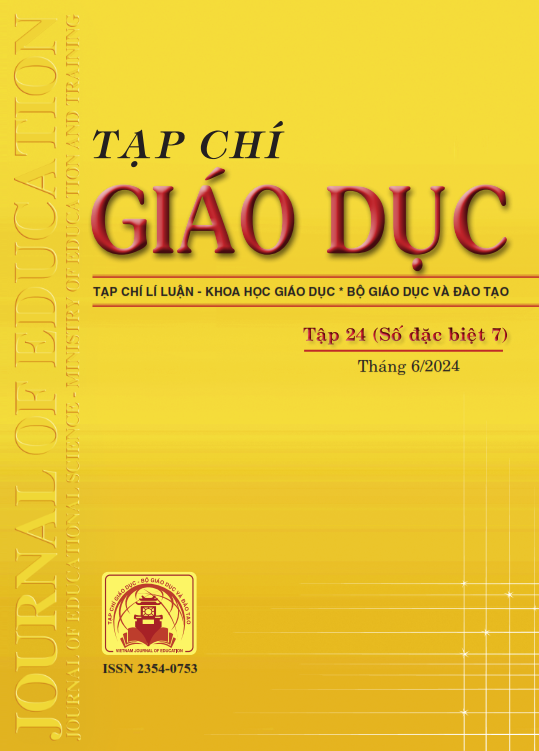Giáo dục đại học trước yêu cầu của cuộc Cách mạng công nghiệp 4.0
Tóm tắt
Higher education is currently facing the challenge of adapting to the context of digital transformation. Therefore, researching the theoretical aspects of concepts and requirements set forth for higher education institutions contributes to providing a theoretical foundation for developing criteria to promote growth for universities across the country. The study has proposed solutions in response to the demands of the Fourth Industrial Revolution, which include: the need for technology-friendly environments, the necessity of equipping essential IT infrastructure, the requirements for the qualifications and competencies of lecturers and staff, and several issues related to state administrative institutions. Enhancing the capacity, qualifications, and potential of educational institutions is a pressing task to innovate and create new methods beyond traditional training approaches. This will attract high-quality human resources and affirm the position of our country's educational training within the region.
Tài liệu tham khảo
Afreen, R., (2014). Bring Your Own Device (BYOD) in Higher Education: Opportunities and Challenges. International Journal of Emerging Trends & Technology in Computer Science, 3(1), 233-236.
Bộ Chính trị (2019). Nghị quyết số 52-NQ/TW ngày 27/9/2019 về một số chủ trương, chính sách chủ động tham gia cuộc Cách mạng công nghiệp lần thứ tư.
Bùi Thị Thúy Hằng (2020). Các công nghệ mới trong giáo dục đại học - Những thách thức và giải pháp khi sử dụng. Tạp chí Nghiên cứu Lí luận, 28, 13-18.
Cevikbas, M., & Kaiser, G. (2022). Promoting personalized learning in flipped classrooms: A systematic review study. Sustainability, 14(18), 11393. https://doi.org/10.3390/su141811393
Đảng Cộng sản Việt Nam (2021). Văn kiện Đại hội đại biểu toàn quốc lần thứ XIII (Tập 2). NXB Chính trị Quốc gia - Sự thật.
Ebron, G. P., & Mabuan, R. A. (2021). Flipped Learning Approach in Teaching Writing in a University Setting: Students’ Experiences, Preferences, and Perspectives. TESOL International Journal, 16(4.4), 161-183.
Hà Nam Khánh Giao (2018). Một số nhận định về trường đại học trước Cách mạng công nghiệp 4.0. https://doi.org/ 10.2139/ssrn.3841928
Hermawan, D. (2021). The rise of e-learning in COVID-19 pandemic in private university: Challenges and opportunities. International Journal of Recent Educational Research, 2(1), 86-95. https://doi.org/10.46245/ ijorer.v2i1.77
Hồ Sỹ Anh (2012). Một số đề xuất góp phần đổi mới giáo dục Việt Nam. Tạp chí Khoa học, Trường Đại học Sư phạm Thành phố Hồ Chí Minh, 39, 152-160.
National Education Association (2008). Technology in Schools: The Ongoing Challenge of Access, Adequacy and Equity. Washington, DC: NEA Policy and Practice Department.
Nguyễn Thị Bích Nguyệt (2021). Vai trò của việc ứng dụng công nghệ trong dạy và học đại học hiện nay. Tạp chí Công thương, 12, 167-171.
Nguyễn Thị Đức Loan, Huỳnh Văn Huy (2017). Ngành giáo dục Việt Nam trong bối cảnh cuộc Cách mạng công nghiệp 4.0. Tạp chí Giáo dục và Xã hội, 76(137), 26-29.
Nguyễn Thông Minh, Nguyễn Thị Thúy An (2021). Nâng cao chất lượng giáo dục đại học trước tác động của cuộc Cách mạng công nghiệp 4.0. Tạp chí Dạy và Học ngày nay, 6, 6-7; 10.
Nguyễn Văn Sáu (2022). Thực trạng và giải pháp nâng cao chất lượng nghiên cứu khoa học của đội ngũ giảng viên Khoa Khoa học cơ bản, Trường Đại học Trà Vinh. Tạp chí Giáo dục, 22(8), 47-51.
Trần Nguyễn Tuyên (2018). Cuộc Cách mạng công nghiệp lần thứ 4 và tác động đối với Việt Nam. Trang Thông tin điện tử Hội đồng Lí luận Trung ương. https://hdll.vn/vi
Đã Xuất bản
Cách trích dẫn
Số
Chuyên mục
Giấy phép

Tác phẩm này được cấp phép theo Ghi nhận tác giả của Creative Commons Giấy phép quốc tế 4.0 .












